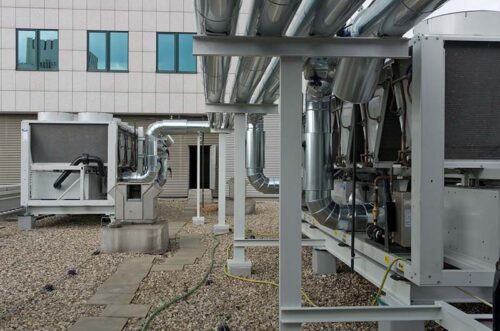As the world increasingly prioritizes climate action, achieving net-zero emissions has become a critical goal across industries. Among the sectors with the most potential for substantial impact is the Heating, Ventilation, and Air Conditioning (HVAC) industry. Driven by both regulatory measures such as Local Law 97 and the global push towards a greener future, companies are exploring advanced technologies that can significantly reduce energy consumption and carbon emissions. This blog explores the intersection of innovative HVAC solutions and their role in propelling us toward net-zero emissions.
The Building Sector’s Role in Emissions

In NYC, the buildings sector is a substantial contributor to energy consumption and emissions. In fact, the sector accounts for approximately 76% of electricity use and 40% of primary energy use in the U.S., along with a corresponding proportion of greenhouse gas emissions, per the Department of Energy. These figures highlight the urgent need for energy-efficient innovations within buildings, which are pivotal in reducing overall carbon footprints.
Advancements in Energy-Efficient Technologies
Companies are increasingly investing in HVAC advancements, which include improved system design, more efficient components, and the integration of smart technologies. By implementing new energy-efficient technologies — be it cooling solutions, smart tech, and/or other innovations — the DOE notes buildings can reduce their energy use by 20% come 2030. Shall the industry continue on the same trajectory, we could see over a 35% reduction in energy use.
Innovative Cooling Solutions
To address rising energy consumption, businesses are turning advanced cooling methods. Direct liquid cooling for chips is one example that minimizes the need for traditional air cooling methods. Additionally, operators are considering hybrid cooling solutions — that improve energy efficiency and reduce costs.
Exploring Renewable Energy Sources
Businesses across NYC should also be investing in renewable energy sources. The transition towards solar, wind, and hydroelectric (as seen by the commission of the $6 billion Champlain Hudson Power Express line) power mitigates reliance on fossil fuels, significantly reducing emissions. This commitment to sustainable practices not only lowers operational costs but also aligns with corporate goals for environmental responsibility.
Integrating Energy Storage Solutions
To optimize the use of renewable tech, businesses should incorporate energy storage systems. A prime example can be found with the N+1 Configuration; N+1 means having one more unit than is needed to cover the load, providing a backup in case of failure. The ‘N’ represents required units, and the ‘+1’ is the redundant backup.
By storing excess energy during periods of low demand or high generation, facilities can draw from these reserves during peak usage, maintaining efficiency and reliability while further reducing emissions.
Balancing Water Usage in Cooling Systems
Water usage, particularly in evaporative cooling systems, presents a dual challenge of environmental and operational efficiency. Operators are innovating to minimize water consumption while balancing it against electricity use. Adopting strategies like air-cooled systems, using alternative water sources, and using high-efficiency components are part of this sustainable transformation.
Moving Towards Sustainable Cooling
One burgeoning trend is the pursuit of sustainable cooling technologies, such as the use of advanced chillers and air handlers, which contribute significantly to energy savings. Furthermore, adopting computer room air conditioning systems that are optimized for low energy and water usage supports the transition to net-zero emissions.
HVAC Challenges in Data Centers
Data centers are at the heart of the digital age, housing the critical infrastructure that supports our daily lives. From cloud computing to online services, the vast quantities of information processed and stored require stringent conditions to ensure uptime, performance, and safety. Integral to this operational prowess are the understated HVAC systems.
With cloud computing, AI, and e-commerce experiencing exponential growth in their respective industries, there lies the plight of increased energy use. As netizens continue to utilize the services of Amazon, Google, Apple, and other corporations, the challenge for achieving net-zero emissions seems like an uphill battle.
As NYC continues to be the home for prominent data centers, it is imperative that new technologies are implemented — not only for Local Law 97 compliance, but for a greener earth.
READ MORE: HVAC FOR DATA CENTERS: WHAT THE INDUSTRY NEEDS TO KNOW
The Road Ahead: Challenges and Opportunities
Achieving net-zero emissions in the HVAC sector faces challenges, particularly in retrofitting existing infrastructure and aligning new technologies with diverse building types. However, these challenges are also opportunities for innovation and collaboration across industries. Contractors, manufacturers, and tech companies must work together to pioneer solutions that are both effective and scalable.
The Importance of Government Support
To incentivize transitions to net-zero technologies, government policies play a crucial role. Tax credits, subsidies, and research grants can accelerate the adoption of cutting-edge technologies and spur on the advancement of new, sustainable solutions.
Reaching Net-Zero Emissions with Donnelly Mechanical
Net-zero emissions in the HVAC industry are within reach, driven by a combination of innovative technology, strategic investment in renewable energy, and sustainable water and energy management practices. As the building sector rises to meet this challenge, it not only addresses the urgent need to combat climate change but also reaps economic benefits through reduced operational costs and improved efficiencies.
At the helm of cutting-edge technology and world-class HVAC service is Donnelly Mechanical, For over 30 years, Donnelly has been the leader in New York City’s commercial HVAC industry. With unparalleled service, expertise, and a commitment to helping building owners achieve net-zero emissions, Donnelly is the company you can count on. To get started with your energy reduction, please visit Donnelly Mechanical’s website and reach out to us today.